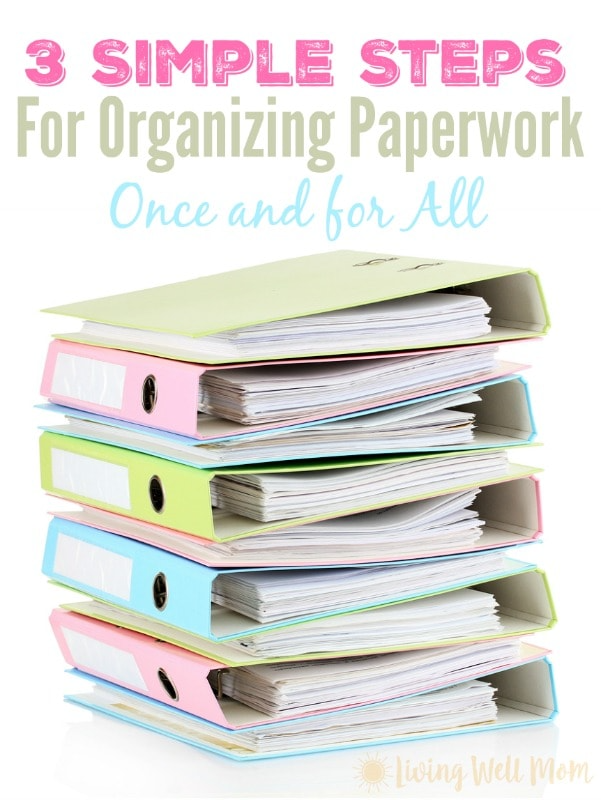Organize Your Kids' Paperwork: Simple Solutions for Parents

Understanding the Challenge

Organizing children’s paperwork can quickly turn into a daunting task for parents. From school assignments and art projects to permission slips and immunization records, the volume of paper that enters a household with kids can be overwhelming. It’s not just about keeping things neat; there’s an underlying issue of maintaining order, ensuring quick access to important documents, and nurturing a habit of organization in children themselves.
The Benefits of Organized Paperwork

Before diving into the solutions, let’s consider the benefits:
- Time-saving: Knowing exactly where to find documents saves hours of rifling through piles of paper.
- Reduction in stress: A clutter-free environment reduces stress levels and promotes a more peaceful home.
- Teaching organization: Implementing these systems helps children learn about organization, responsibility, and time management.
- Accessibility: Important documents are easily accessible when needed, reducing the risk of missed opportunities or penalties.
Simple Solutions for Parents

Categorize Documents

Begin by sorting the paperwork into distinct categories:
- School Work: Assignments, tests, and notes from teachers.
- Artwork and Projects: Anything your child has created at school or home.
- Health Records: Immunization records, health check-up summaries, and medication logs.
- Permissions and Events: Field trip forms, event tickets, and invitations.
- Personal Documents: Report cards, awards, certificates, and personal achievements.
Use a color-coded system or labels to make categorization visual and intuitive.
Implement Filing Systems

Having established categories, here’s how to manage the paperwork effectively:
Use Binders or Folders
Binders with clear front pockets for labels can house each category. Within each binder, use page protectors or pockets for document protection. Here’s how you might organize:
| Category | Description |
|---|---|
| School Work | Divided by grade or subject. |
| Artwork | Organized by size or theme. Larger works can be photographed and saved digitally. |
| Health Records | Chronologically ordered by date. |
| Permissions | By due date or event date. |
| Personal Documents | Kept in order of importance or date achieved. |

Storage Bins
For larger items or items that won’t fit in binders:
- Use clear, plastic storage bins with labels for each category.
- Keep them accessible but stored away to avoid clutter.
Digital Storage
Consider:
- Scanning important documents to keep digital copies.
- Using cloud storage solutions like Google Drive or Dropbox for easy access.
- Labeling and organizing digital folders similarly to physical ones.
🛠️ Note: Be cautious when digitizing documents. Make sure the information is secure, especially for sensitive documents.
Maintaining the System

Create a routine:
- Weekly sorting sessions where new documents are categorized.
- Purge unnecessary documents periodically. For example, after the school year, decide what to keep or let go.
- Involve your children in the process to teach them organization skills.
Engaging Your Children

Children can play a significant role in keeping their paperwork organized:
- Allow them to decorate folders or binders with their artwork or labels.
- Teach them to sort their own papers. Use clear bins or drawers labeled with pictures or words.
- Create a ‘portfolio’ of their best work to showcase their growth over time.
Taking It to the Next Level

Here are some advanced tips for parents looking to streamline the process even further:
- Set Digital Alerts: Use calendar apps to set reminders for important dates or documents.
- Go Paperless: Opt for digital versions of documents where possible, reducing the physical clutter.
- Home Office: Consider setting up a small home office or study area with organizational systems in place.
As the final thoughts settle in, remember that organizing your children's paperwork isn't just about keeping things tidy. It's about instilling life skills, reducing stress, and ensuring that important documents are never lost in the shuffle. By involving your children in the process, you're not only teaching them organization but also building a foundation for their future success in managing life's complexities.
How often should I organize my child’s paperwork?

+
Set a weekly or bi-weekly routine to manage and sort new documents, and a more thorough purge at the end of each school semester or year.
What should I do with all the artwork my child brings home?

+
Photograph larger pieces or ones you can’t keep. Keep the best pieces in a portfolio and rotate the rest in and out of display areas around the house.
How do I teach my child to organize their own paperwork?

+
Start by involving them in the sorting process, using clear labels and color-coding to make it easier. As they grow, increase their responsibility in maintaining the system.



